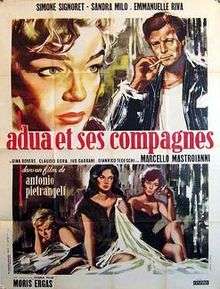Adua and Her Friends
Adua and Her Friends (Italian: Adua e le compagne), also known as Hungry For Love, is a 1960 Italian film directed by Antonio Pietrangeli with a collaborative screenplay by the film's director together with Ruggero Maccari, Ettore Scola and Tullio Pinelli. The movie is about four prostitutes who start a restaurant after their brothel is shut down by the Merlin law, which made brothels illegal in Italy.
| Adua and Her Friends (Adua e le compagne) | |
|---|---|
 | |
| Directed by | Antonio Pietrangeli |
| Produced by | Moris Ergas |
| Written by | Ruggero Maccari, Antonio Pietrangeli, Ettore Scola, Tullio Pinelli |
| Starring | Sandra Milo, Marcello Mastroianni, Simone Signoret |
| Music by | Piero Piccioni |
| Cinematography | Armando Nannuzzi |
| Edited by | Eraldo Da Roma |
| Distributed by | Titanus |
Release date | 1960 |
Running time | 106 minutes |
| Country | Italy |
| Language | Italian |
Plot
In 1958, the Merlin law made brothels illegal in Italy. Adua, Lolita, Marilina and Millie are four prostitutes whose brothel in Rome is shut down. Under Adua's leadership, they pool their savings, two million lire apiece, to open a restaurant on the outskirts, which will be a cover for an illegal brothel. They rent a run-down building and hire workmen to fix it up but, when they apply for a permit to open the restaurant, their application is rejected because of their history of prostitution. One of Adua's former customers, Ercoli, agrees to buy the building and use his connections to get the permit in his name, in return for a rent of one million lire a month.
The restaurant turns out to be unexpectedly successful, and the women effectively abandon their plans to offer sexual services and start to lead respectable lives. But the restaurant doesn't earn as much as they could make as a brothel, and they can't pay Ercoli his rent. Ercoli gives them an ultimatum: start working as prostitutes again, and pay him his rent, or he will kick them out in 24 hours. When Ercoli returns, Adua refuses, humiliates him, and he leaves. In revenge, he has them all arrested for prostitution, their pictures are in the newspapers, and their respectable lives are destroyed. Adua ends up working in the streets again.
Cast
- Simone Signoret: Adua Giovannetti
- Sandra Milo: Lolita
- Emmanuelle Riva: Marilina
- Gina Rovere: Milly
- Claudio Gora: Ercoli
- Ivo Garrani: Avvocato
- Gianrico Tedeschi: Stefano
- Antonio Rais: Emilio
- Duilio D'Amore: Frate Michele
- Valeria Fabrizi: Fosca la bionda
- Luciana Gilli: Dora
- Enzo Maggio: Calypso
- Domenico Modugno: Himself
- Marcello Mastroianni: Piero Silvagni
References
- Salvatori, Alessandra. "Adua e le compagne – Recensione DVD – scheda, trailer, foto, dvd". RECENSIONE DVD Adua e le compagne. Archived from the original on April 27, 2006. Retrieved January 14, 2006.